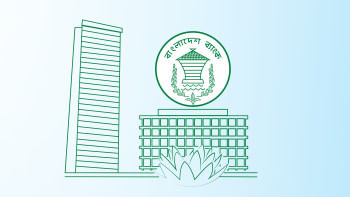Undertaking projects in suburbs

Picture shows apartments under construction. The demand for taking up such projects in the suburbs now comes to the fore to make housing affordable to the middle and lower middle-income people. Photo: STAR
Dhaka is now a city in disarray. The slum population is increasing at an alarming rate.
There is a need for 150,000 new residential units a year, while developers are able to build only up to 7,000 units.
Due to the exorbitant price of land, the cost of apartments in the city has skyrocketed to a point where it is just not affordable to a middle-income person.
Add to this, the payments that need to be made to local hooligans at every site and the speed money that needs to be paid for plan approval and utility connections -- such as gas, water, and electricity -- you have a grossly overpriced product. This is being borne by the hapless customers.
A rhetoric often used is that developers build only for the rich and not for the middle or lower middle-income groups. From the above, it is obvious why it is not possible to develop anything for the mid-income families in the cities.
Self-contained projects need to be undertaken in the suburbs for the middle and lower middle-income people. Now, this also poses many problems. Most outlying areas do not have proper infrastructure to sustain a planned residential community. For this, the government is responsible.
Considering the dire housing crisis, should a developer still wish to take chances and undertake a project in the outlying areas?
Almost all the land in the suburbs is either classified as flood or sub-flood zones or agricultural land. And this means that a developer will not get permission to build on the land. The fact that there are hundreds of houses built in the vicinity of the said land makes a greater mockery of zoning. So the door is shut and the developer is barred from undertaking any apartment development projects in the suburbs.
The next option for the apartment developer would be to buy land in a project developed by a land developer. There are many such projects that have been developed and individual plots sold by land developer over the last 10-15 years. But the travesty here is that while thousands of acres of land have been developed by scores of developers and sold for billions of taka to thousands of buyers, none of these projects have not got any approval from the government.
And yet, these developers are carrying on their activities right under the nose of the authority. The buyers of the plots in these projects are also investing their life savings in these projects, knowing fully that these projects are not approved.
Until these projects get formal approval, no building plans will be approved on these lands and thus, while Dhaka is choking, thousands of acres of developed land that is ready to be built upon is lying vacant or people are being compelled to make unauthorised construction.
Obviously there is something seriously wrong somewhere for this bizarre scenario.
Two of the evident problems are -- the so-called environmental experts who seem to have a problem with development taking place anywhere and the so-called experts who have created a flawed policy in the form of the 'Bhumi Unnayan Bidhimala 2004' (regulations for land development).
Since its inception, not a single land development project has been approved under the Bhumi Unnayan Bidhimala 2004. Due to space constraints, it is not possible to analyse the flaws of the regulations in this article but it is quite obvious that in its present form, it is an obstacle to development.
The once beautiful Dhaka city is now an urban catastrophe.
Water tables are falling by up to 3 metres a year, the lakes and rivers have been killed, the level of pollution is one of the highest in the world, traffic jams are a major drain on our national economy, the sewerage system is on the verge of collapse and there is no open green space for environmental harmony.
Urgent steps are needed to save the city. A pragmatic policy needs to be developed and implemented with the help of qualified foreign experts and also with the input of the leaders of the real estate sector.
This responsibility can no longer be given to the same authorities who have for so long been entrusted with the duty of ensuring the growth and development of Dhaka and who have failed miserably to take any effective measures. These are the ones, and not the realtors, who must be held accountable for the present sorry state of our beloved city.

 For all latest news, follow The Daily Star's Google News channel.
For all latest news, follow The Daily Star's Google News channel. 



Comments